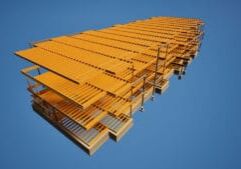The Blueprint for Accountability: How Mastery, Autonomy, and Purpose Drive Performance in Construction & Manufacturing
Building a High-Performance, High-Connection, High-Accountability Culture

HR Huntsman is a speaker and coach at Leader's Edge.
Accountability is one of the most critical elements of a thriving organization, yet many leaders in the construction and manufacturing industries struggle to create a culture where it truly thrives. High-performance teams require more than just technical skills and efficiency—they need strong accountability, alignment with the company’s vision, and a deep sense of ownership.
Yet, accountability often gets a bad reputation. It is frequently associated with micromanagement, fear, and punitive action. In reality, true accountability is about empowerment—setting clear expectations, fostering autonomy, and ensuring that every team member takes ownership of their role.
So, how can leaders foster a high-performance, high-connection, high-accountability culture in industries where precision, efficiency, and execution are paramount? The answer lies in focusing on three essential components:
- Mastery – Developing expertise and ownership.
- Autonomy – Giving teams control over their success.
- Purpose – Connecting work to a bigger mission.
When these three elements are in place, accountability becomes not just a requirement, but a natural outcome of a highly engaged, self-motivated workforce.
The Power of Accountability in Modular Construction & Manufacturing
In industries where deadlines are tight, labor shortages are common, and profit margins depend on efficiency, accountability is a performance multiplier.
So, how do we embed accountability into the DNA of our organizations? It starts with mastery, autonomy, and purpose—three principles that create a culture of ownership, motivation, and results.
1. Mastery: Building Skill & Ownership
In modular construction and manufacturing, skill and expertise define success. When a team is deeply invested in mastering their craft, they take more pride in their work and naturally hold themselves accountable for delivering excellence.
By investing in mastery, leaders create a workforce that takes pride in their craft and owns their performance.
2. Autonomy: Giving Teams Control Over Their Success
One of the biggest accountability killers in any organization is over-management. When leaders control every decision, teams lose their ability to think critically and take initiative.
When autonomy is structured properly, it builds self-accountability because team members own their decisions and results.
Spotify is known for its high-autonomy culture, particularly through its Squad Model, which allows small, cross-functional teams to operate like mini-startups within the company.
Each squad has the autonomy to decide what to build, how to build it, and how to collaborate, as long as they align with the company’s overall mission. Engineers, designers, and product managers work without layers of approvals, leading to faster innovation and high ownership.
For example, when Spotify wanted to improve its Discover Weekly feature, a small squad ran experiments without waiting for executive buy-in. Their autonomous approach led to one of Spotify’s most-loved features, boosting user engagement and setting an industry standard for personalized playlists.
Autonomy doesn’t mean zero oversight—it means setting clear expectations and allowing teams to execute without being micromanaged.
3. Purpose: Connecting Work to a Bigger Mission
In modular construction and manufacturing, it’s easy to view work as just tasks to complete—installing ducting, building a frame, assembling parts. But when teams see their work as part of a greater mission, accountability becomes personal.
People work harder when they feel connected to something bigger than themselves.
Most team members don’t eat, sleep, and breathe the organization’s mission the way leadership does. Each person has their own dreams, aspirations, and personal goals—their own purpose.
This is where strong connection becomes a game-changer. When leaders take the time to truly understand their team members’ ambitions and show a genuine desire to help them succeed, engagement skyrockets.
At the core, people want to know they matter. People want to know they belong.
Leaders who foster this level of connection create teams that are not just accountable—but deeply committed to the bigger vision.
Practical Strategies to Embed Accountability
1. Use Success Trackers
- Implement Leading & Lagging KPIs to measure both activity (leading) and results (lagging).
- Use a color-coded stoplight system (Green = On Track, Yellow = Needs Attention, Red = Off Track).
- Meet weekly or bi-weekly to review progress, remove roadblocks, and recalibrate.
2. Create a Culture of Radical Ownership
- Train leaders to ask: “What part of this outcome do I own?”
- Encourage employees to focus on solutions, not excuses.
- Embed accountability into performance reviews and promotions.
3. Lead with Coaching, Not Control
- Shift from command-and-control leadership to coaching-based leadership.
- Ask questions that drive ownership, like:
- “What’s your plan to fix this?”
- “What could you do differently next time?”
4. Reinforce Accountability with Recognition
- Publicly recognize employees who own their responsibilities.
- Reward initiative, problem-solving, and reliability.
Conclusion: Building a Culture of Ownership & Excellence
A truly great workplace is one where accountability isn’t forced—it’s embraced. Leaders in construction and manufacturing who build cultures focused on Mastery, Autonomy, and Purpose will see:
Are you empowering your team to own their success, or are you holding them back?
By investing in mastery, autonomy, and purpose, you can Level UP, Play BIG, and drive accountability that leads to extraordinary results.
More from Modular Advantage
Behind the Design of Bethany Senior Terraces, NYC’s First Modular Passive House Senior Housing Project
As more developers seek to meet new regulations for energy efficiency, the team at Murray Engineering has set a new record. With the Bethany Senior Terraces project, Murray Engineering has helped to develop NYC’s first modular structure that fully encompasses passive house principles — introducing a new era of energy efficiency in the energy-conscious city that never sleeps.
How LAMOD is Using Modular to Address Inefficiency, Sustainability, and the Future of Construction
As developers, designers, and contractors seek to understand the evolving needs of the modular industry, no one is as well-versed in the benefits of going modular as Mārcis Kreičmanis. As the co-founder and CBDO of LAMOD in Riga, Latvia, Mārcis has made it his ultimate goal to address the inefficiencies of traditional construction.
From Furniture Builder to ‘Activist Architect’: Stuart Emmons’ Unique Journey
Stuart Emmons was fascinated by buildings at a young age. He remembers building sand cities with his brother during trips to the Jersey shore. His father gave him his first drawing table at the age of ten. Today, he is an experienced architect who received his FAIA in June 2025. The road he took is unique, to say the least.
Forge Craft Architecture + Design: Codes, Contracts, and Intellectual Property
Founding Principal and Director of Modular Practice for Forge Craft Architecture + Design, Rommel Sulit, discusses the implications of codes, contracts, and intellectual property on
modular construction.
Eisa Lee, the “Bilingual” Architect
Now as the founder of XL
Architecture and Modular Design in Ontario, Canada, she applies not just her education as a traditional architect but an entire holistic view on modular design. It’s this expansive view that guides her work on being a true partner that bridges the gap between architects and modular factories as they collaborate on the design process.
Tamarack Grove Engineering: Designing for the Modular Sector
The role of a structural engineer is crucial to the success of a modular project, from initial analysis to construction administration. Tamarack Grove offers structural engineering services — project analysis, plan creation, design creation, and construction administration — for commercial, manufacturing, facilities, public services, and modular. Modular is only one market sector the company serves but it is an increasingly popular one.
Engineer Masters the Art of Listening to His Customers
Since founding Modular Structural Consultants, LLC. in 2014, Yurianto has established a steady following of modular and container-based construction clients, primarily manufacturers. His services often include providing engineering calculations, reviewing drawings, and engineering certification
Inside College Road: Engineering the Modules of One of the World’s Tallest Modular Buildings
College Road is a groundbreaking modular residential development in East Croydon, South London by offsite developer and contractor, Tide, its modular company Vision Volumetric (VV), and engineered by MJH Structural Engineers.
Design for Flow: The Overlooked Power of DfMA in Modular Construction
Unlocking higher throughput, lower costs, and fewer redesigns by aligning Lean production flow with design for manufacturing and assembly.
Choosing the Right Ramp
Modular construction offers a compelling alternative to traditional methods for designing and building ADA and IBC-compliant entrances. By addressing the challenges of traditional construction, such as time-consuming processes, unavailable specialized labor, and variable field conditions, modular solutions provide a more efficient, cost-effective, and reliable approach.










